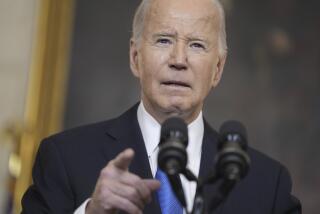Bill on Paying U.N. Back Dues Far From Settled
- Share via
WASHINGTON — A bill pledging to pay the United Nations most of what the United States owes--once hailed as a grand compromise between Secretary of State Madeleine Albright and Sen. Jesse Helms (R-N.C.)--is now languishing after unsuccessful negotiations between the Senate and the House.
The main obstacle is a provision in the House version of the bill barring funds for international groups that offer abortions or advocate the procedure for family planning purposes and deleting the annual $25-million contribution to the U.N. Population Fund as long as it operates in China. The Chinese government uses abortion as a family planning tool.
But there also is congressional resistance to an attempt by the Clinton administration to soften some of the measure’s stringent demands on the U.N. to reform itself and charge the U.S. less in dues.
The demands are so tough that many analysts believe that the United Nations can never meet them. “If the U.N. met every condition in the bill,” said U.N. expert Edward C. Luck, “it would be marginalized. It would no longer be a player.”
The bill, passed by the Senate in June by an overwhelming 90-5 vote, would pay the U.N. $819 million of U.S. arrears over the next three years provided that the world body agreed to a host of changes--including a sharp cut in the annual assessment paid by this country and an increase in the payment by others to make up for the reduction.
The arrears have built up since the Reagan administration, when Congress began withholding part of the annual assessment as a way of pressuring the U.N. to carry out reforms.
The pending bill would also abolish the independence of the U.S. Information Agency and the Arms Control and Disarmament Agency and make them part of the State Department. An earlier version passed by the House authorized the State Department reorganization but included no provisions on U.N. arrears.
Senate and House negotiators, meeting in a conference committee, had hoped to agree on a bill before the August recess but failed. They will have to try again in September.
It is widely assumed that President Clinton will veto any bill containing the antiabortion provision, but Rep. Christopher H. Smith (R-N.J.), the provision’s chief sponsor, has refused to withdraw it.
Clinton administration officials hailed passage of the Senate bill at first and described it as a fruit of the warm relationship between Albright and Helms, chairman of the Senate Foreign Relations Committee. But second thoughts developed about the bill’s various provisions.
“The conditions,” Luck said, “are far more intrusive than the administration wanted and more obnoxious and insulting than the U.N. feels it can stomach.”
According to a State Department official, the administration proposed to the Senate and House conferees that the bill give Albright authority to waive one condition of her choice in each of the three years. But the conferees have refused to accept this so far.
The conditions in the Senate bill increase in severity over the three years. The bill would authorize a payment of $100 million of arrears in the 1998 fiscal year as long as the U.N. refrained from raising a standing army, taxing the American people, controlling property in the U.S. outside of its New York headquarters and forcing the United States to violate its own Constitution. Since the U.N. has neither the will nor means to do any of these things, it should receive the first payment quickly.
In the 1999 fiscal year, however, the bill would authorize a second payment of $475 million only if the U.S. assessment is reduced from 25% of the regular operating budget (which now runs to $1.25 billion a year) to 22%, and the U.S. assessment for peacekeeping efforts is reduced from 30% of each mission’s total cost to 25%. These reductions may be difficult, however, because they must be approved by the General Assembly, where each of the U.N.’s 185 member states has a vote.
Many countries may refuse to go along; they resent the U.S. attempt to order a unilateral reduction of its own assessment, thus forcing many of the others to pay more.
A payment of $244 million would go to the U.N. in the 2000 fiscal year if, among a host of other conditions, the world organization reduced the U.S. assessment even more and restored to the United States a seat on the important Committee on Administrative and Budgetary Questions. The U.S. had been a member of this panel since the U.N.’s founding in 1945 but failed to win reelection earlier this year.
More to Read
Get the L.A. Times Politics newsletter
Deeply reported insights into legislation, politics and policy from Sacramento, Washington and beyond. In your inbox twice per week.
You may occasionally receive promotional content from the Los Angeles Times.










